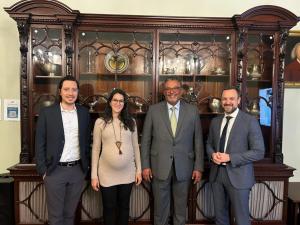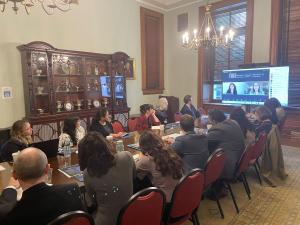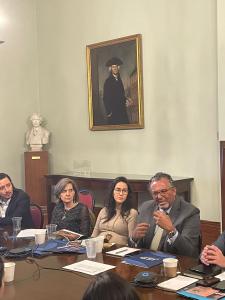On April 10, 2024, the Konrad Adenauer Foundation, New York Office in close cooperation with the Cyrus R. Vance Center and the New York City Bar Association co-hosted a panel discussion titled "Transitional Justice in the 21st Century: Rethinking Justice through Colombia’s Special Jurisdiction for Peace.” The meeting took place in the Cromwell Room of the New York City Bar Association. This meeting coincided with the Security Council's open briefing on recent developments, followed by closed consultations, in Colombia, as well as last week’s report briefing before the Human Rights Council.
The Foundation hosted as a keynote speaker Dr. Roberto Vidal, the magistrate president of the Special Jurisdiction for Peace. Dr. Carlos Ruiz Massieu, the Special Representative of the UN Secretary-General and Head of the Verification Mission for Colombia and Dr. Antonia Urrejola, the UN-appointed international law expert to oversee the implementation of the peace agreement in Colombia joined as panelists.
The Special Jurisdiction for Peace (Jurisdicción Especial para la Paz; JEP, by its Spanish acronym) emerged from the Final Peace Agreement signed between Colombia’s Government and the former guerrilla FARC-EP on November 24, 2016. JEP is the judicial component of the Comprehensive System for Peace responsible for administering restorative transitional justice, fostering transformation towards peace and repairing social structures, and ensuring the victim’s rights and legal security of those appearing before this tribunal. Its operation focuses on territorial, differential, and gender perspectives.
As discussed by the panelists, the JEP is tasked with investigating, judging, and sanctioning the gravest crimes committed before December 1st, 2016, within the context of the internal armed conflict that lasted over 50 years. Individuals who are mandated to appear before JEP include former members of the now-dissolved FARC-EP and members of the Military Forces. Additionally, third-party civilians, state agents who are not part of the public force, and individuals involved in social protest may voluntarily submit themselves to JEP’s jurisdiction. “The JEP contributes to fulfilling the promise of justice and to heal the wounds in Colombian society after 50 years of conflict,” said Thomas Tödtling, Executive Director of KAS New York Office and Representative to the UN.
Panelists also presented a general overview of the history of and operation of the Special Jurisdiction for Peace and focused on key issues including upcoming landmark judgments resulting from so-called macro cases (macro casos), specific criminal investigations and their specific challenges, as well as the enforcement of restorative sanctions. During this conversation, panelists discussed the outcomes of the recent briefings and reports presented before the UN Security Council and the Human Rights Council and reiterated the need to continue fostering collaboration and partnerships among the national and the various UN agencies involved in the monitoring and implementation of the 2016 peace agreement.
Most importantly, both national and international authorities shared with the audience progress but also pending challenges and the need for international support as the Special Jurisdiction is steadily working on achieving its main goal: to procure the victims' rights to justice, provide them with truth and contribute to their reparation--all of that to build a stable and lasting peace in Colombia.
This constructive dialogue shows how national officials continue to show determination to consolidate peace in the country despite the various challenges they face eight years into the agreement’s implementation and how the international community, particularly, UN agencies have been supporting JEP every step of the way.
Welcome remarks were given by Mr. Thomas Tödtling, Executive Director of KAS New York Office and Representative to the UN, and the panel was moderated by Dr. Mónica Castillejos-Aragón, KAS New York, Program Manager Rule of Law and International Justice.





